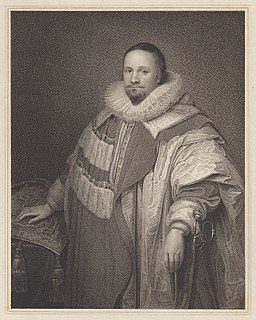
Thomas Coventry, 1st Baron Coventry was a prominent English lawyer, politician and judge during the early 17th century.

Baron Churston, of Churston Ferrers and Lupton in the County of Devon, is a title in the Peerage of the United Kingdom. It was created in 1858 for the former Conservative Member of Parliament, Sir John Yarde, 3rd Baronet. He had earlier represented South Devon in the House of Commons. Two years later, in 1860, he assumed by Royal licence the additional surname of Buller. As of 2014 the titles are held by his great-great-great-grandson, the fifth Baron, who succeeded his father in 1991.

Henry Lascelles, 2nd Earl of Harewood DL, known as Viscount Lascelles from 1814 to 1820, was a British peer, slave owner and Member of Parliament.

William Saunders Sebright Lascelles PC was a British Whig politician. He served as Comptroller of the Household from 1847 to 1851.
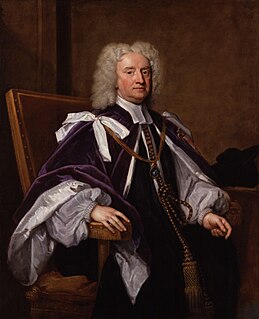
Sir Jonathan Trelawny, 3rd Baronet was a British Bishop of Bristol, Bishop of Exeter and Bishop of Winchester. Trelawny is best known for his role in the events leading up to the Glorious Revolution which are referenced in the Cornish anthem The Song of the Western Men.
Henry Lascelles, 3rd Earl of Harewood DL, known as Viscount Lascelles from 1839 to 1841, was a British peer and Member of Parliament.
There have been three baronetcies created for members of the Clerke family. One creation is extant as of 2008.
The High Sheriff of Devon is the Queen's representative for the County of Devon, a territory known as his/her bailiwick. Selected from three nominated people, they hold his office over the duration of a year. They have judicial, ceremonial and administrative functions and executes High Court Writs. The office historically was "Sheriff of Devon", changed in 1974 to "High Sheriff of Devon".
Peter Burrell FRS was a British politician and barrister.

The Sebright Baronetcy, of Besford in the County of Worcester, is a title in the Baronetage of England. It was created on 20 December 1626 for Edward Sebright, High Sheriff of Worcestershire who later fought as a Royalist in the Civil War. He was the son of John Sebright of Blakeshall, Wolverley and was the heir of his uncle William Sebright (1541–1620) of Besford, who established by his will in 1620 the charity "Sebright's Endowed Schools", still surviving today and very richly endowed as "Sebright's Educational Foundation". The fourth Baronet sat as Member of Parliament for Hertfordshire. The sixth Baronet represented Bath in the House of Commons. The seventh Baronet was Member of Parliament for Hertfordshire and also became known as an agriculturalist. The family's fortunes ebbed by the end of the nineteenth century, with the ninth Baronet leaving only £5 at his death. As of 28 February 2014 the present Baronet has not successfully proven his succession and is therefore not on the Official Roll of the Baronetage, with the baronetcy considered dormant since 1995.

The Sebright is a British breed of bantam chicken. It is a true bantam – a miniature bird with no corresponding large version – and is one of the oldest recorded British bantam breeds. It is named after Sir John Saunders Sebright, who created it as an ornamental breed by selective breeding in the early nineteenth century.

Sir John Saunders Sebright, 7th Baronet,, of Besford, Worcestershire, and Beechwood Park, Hertfordshire, was an English politician and agricultural innovator.
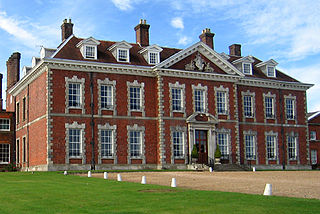
General Sir John Saunders Sebright, 6th Baronet was the sixth Sebright baronet, an officer in the British Army and a Member of Parliament.
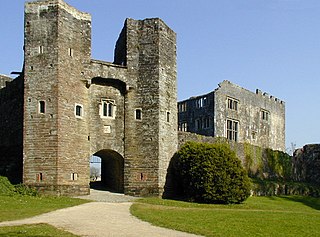
Sir Edward Seymour, 3rd Baronet of Berry Pomeroy Castle was an English politician who sat in the House of Commons at various times between 1640 and 1688. He fought for the Royalist cause in the English Civil War.
The High Sheriff of Carlow was the British Crown's judicial representative in County Carlow, Ireland from the 14th century until 1922, when the office was abolished in the new Free State and replaced by the office of Carlow County Sheriff. The sheriff had judicial, electoral, ceremonial and administrative functions and executed High Court Writs. In 1908, an Order in Council made the Lord-Lieutenant the Sovereign's prime representative in a county and reduced the High Sheriff's precedence. However the sheriff retained his responsibilities for the preservation of law and order in the county. The usual procedure for appointing the sheriff from 1660 onwards was that three persons were nominated at the beginning of each year from the county and the Lord Lieutenant then appointed his choice as High Sheriff for the remainder of the year. Often the other nominees were appointed as under-sheriffs. Sometimes a sheriff did not fulfil his entire term through death or other event and another sheriff was then appointed for the remainder of the year. The dates given hereunder are the dates of appointment. All addresses are in County Carlow unless stated otherwise.

There have been two baronetcies created for persons with the surname Danvers, one in the Baronetage of England and one in the Baronetage of Great Britain. Both creations are extinct.
John Sebright of Totnes, Devon, was an English politician.
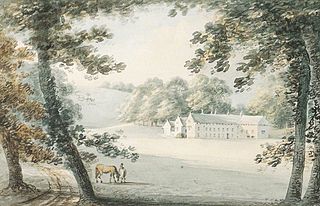
Stephen Northleigh (?1692-?1731), of Peamore, Exminster, Devon, was an English politician who sat in the House of Commons from 1713 to 1727.

Sir Thomas Sebright, 4th Baronet (1692–1736) of Beechwood Park was a British landowner and politician who sat in the House of Commons from 1715 to 1736.











